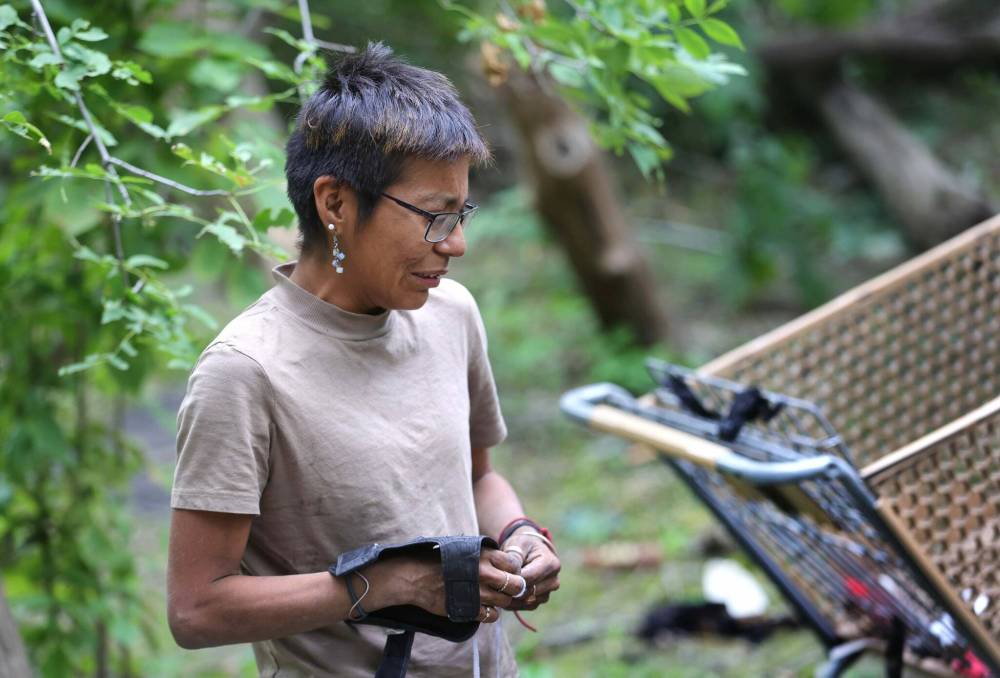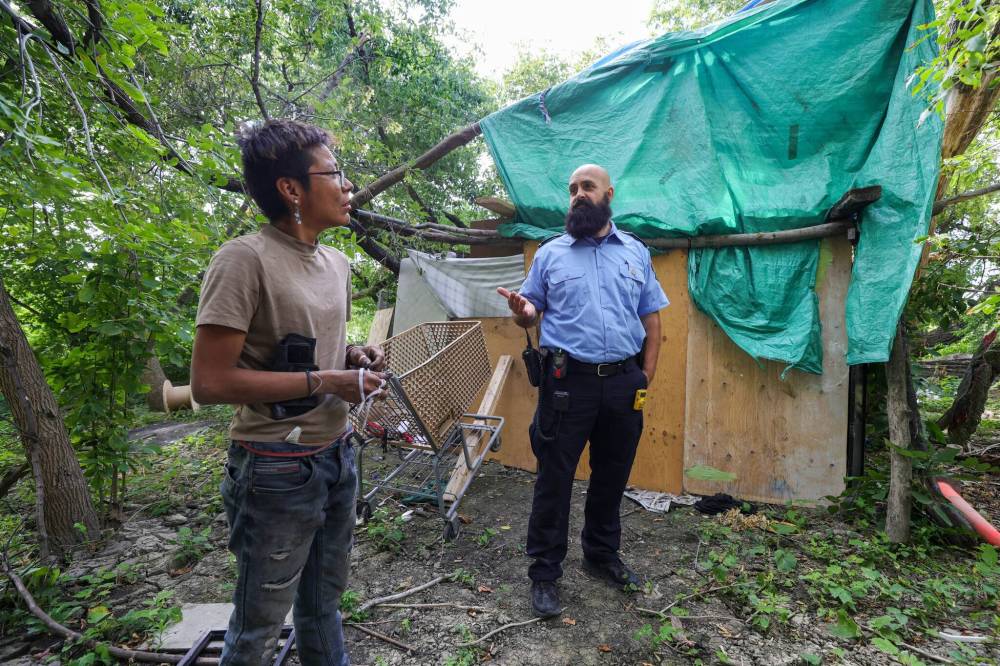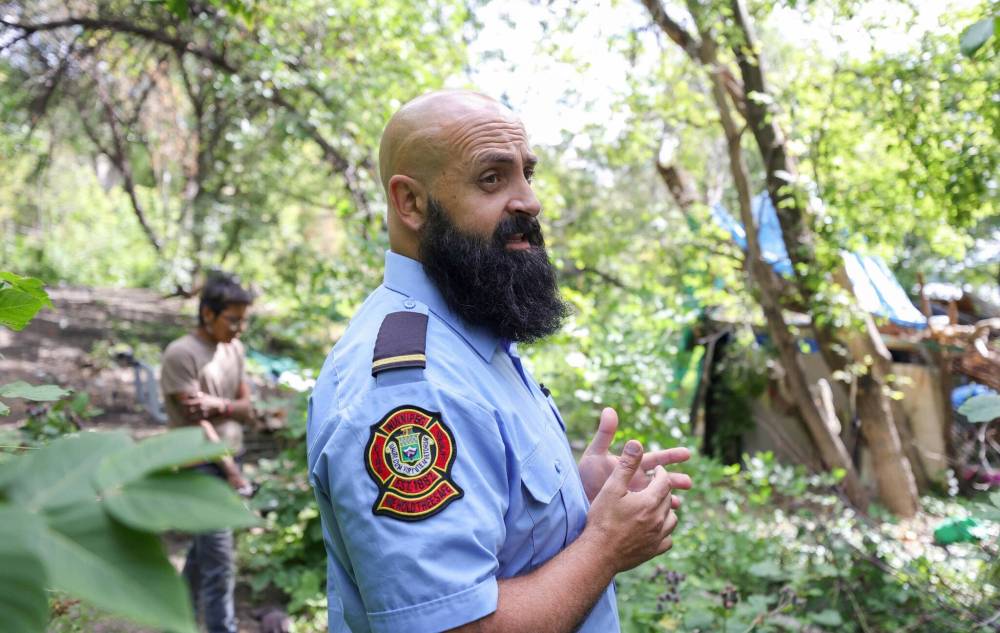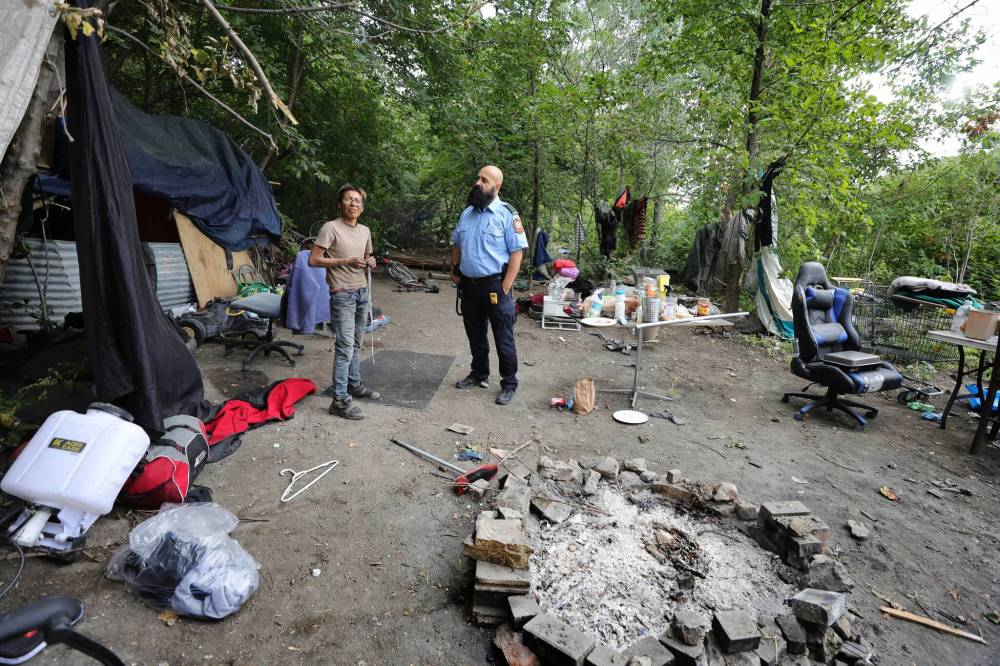‘It comes down to wanting to keep people safe’ Fire safety outreach at city homeless encampments sparks connections
Read this article for free:
or
Already have an account? Log in here »
To continue reading, please subscribe:
Monthly Digital Subscription
$0 for the first 4 weeks*
- Enjoy unlimited reading on winnipegfreepress.com
- Read the E-Edition, our digital replica newspaper
- Access News Break, our award-winning app
- Play interactive puzzles
*No charge for 4 weeks then price increases to the regular rate of $19.00 plus GST every four weeks. Offer available to new and qualified returning subscribers only. Cancel any time.
Monthly Digital Subscription
$4.75/week*
- Enjoy unlimited reading on winnipegfreepress.com
- Read the E-Edition, our digital replica newspaper
- Access News Break, our award-winning app
- Play interactive puzzles
*Billed as $19 plus GST every four weeks. Cancel any time.
To continue reading, please subscribe:
Add Free Press access to your Brandon Sun subscription for only an additional
$1 for the first 4 weeks*
*Your next subscription payment will increase by $1.00 and you will be charged $16.99 plus GST for four weeks. After four weeks, your payment will increase to $23.99 plus GST every four weeks.
Read unlimited articles for free today:
or
Already have an account? Log in here »
Hey there, time traveller!
This article was published 09/08/2023 (854 days ago), so information in it may no longer be current.
Kat Smith-Sutherland keeps a safe, tidy fire at the Fort Douglas Park encampment. Steven Antle is there to make sure it stays that way.
In a year when fire calls to homeless encampments have averaged 50 per month, Antle, a fire-prevention officer with the Winnipeg Fire Paramedic Service, visits up to five camps each workday to encourage the residents to do their part for fire safety.
The shallow pit at Winnipeg’s Fort Douglas Park, surrounded by a ring of rocks and broken bricks, is the only approved fire site. The fire provides needed warmth and a heat source for cooking.
Smith-Sutherland, 37, and other residents keep it from burning higher than needed, away from the overhanging trees and the tents and makeshift shelters of tarps and wood along the Red River off Waterfront Drive.
RUTH BONNEVILLE / WINNIPEG FREE PRESS Kat Smith-Sutherland has been living in the camp at the southern edge of the South Point Douglas neighbourhood for the better part of a year-and-a-half.
She appreciates Antle’s efforts.
“He’s a great guy, he’s not out to shut me down,” Smith-Sutherland says, as she and Antle walk through another nearby camp, where she recently got the residents to put out an unsafe fire until they can build a ringed pit.
Antle and Smith-Sutherland talk warmly, joking at times, on Wednesday morning, when the WFPS invited the Free Press to tour with Antle and write about the work he’s done to prevent fires at homeless camps from turning injurious or deadly.
Number of fire calls at homeless encampments in 2023
- January – 28
- February – 22
- March – 36
- April – 39
- May – 62
- June – 48
- July – 73
* The numbers represent the total number of fires at encampments reported to WFPS, not just fires extinguished.
In February 2021, aerosol cans ignited and exploded at a Higgins Avenue encampment, killing one person. In each of July and in January, the WFPS responded to 73 fire calls at various camps. Most months, there are more than 30 such calls.
“There’s been numerous near misses. Folks that have said: ‘There was a propane tank that blew in my tent and it blew me out of the tent.’ A handful of folks who’ve said they barely made it out alive. This is the reason I’m doing this work, to make sure that we keep them safe,” says Antle.
“It’s terribly tragic that we’ve even had one death, but I think that the work that we’re doing is helping those numbers stay down.”
Antle’s advice is straightforward: burn small fires at least three metres from structures or other combustible materials, only burn split wood, have someone watch it 24-7, and keep something ready to extinguish flames and coals.
“As much as we stress these are the things we want to follow, there’s times where it’s not followed, so we follow it up with a notice to say: ‘Here are the things that need to get changed up,’” he says.
“If they don’t get changed up, there’s going to be action, and it can lead to an encampment being vacated and shut down for safety reasons.”
RUTH BONNEVILLE / WINNIPEG FREE PRESS Steven Antle and Kat Smith-Sutherland talk on Wednesday morning, when the WFPS invited the Free Press to speak with Antle about the work he’s done to prevent fires at homeless camps from turning injurious or deadly.
Antle also tells encampment residents not to burn plastic-coated copper wire — to break it down to scrap metal to sell for cash — as it’s a nuisance to nearby residents and an environmental hazard.
His work in the summer, when the number of encampments grows, differs from the winter, when it contracts but fire safety is more pressing, with people burning fires inside or close to their shelters to stay warm.
“We shift toward: let’s get you into housing. But it gets more difficult to convince folks not to have fires within their structures when warmth and heat is a necessity to live.”
Antle also tries to connect people living in the camps with agencies that provide other support services and eventually, housing.
“We have to understand that some folks have gone through absolutely horrific things… Homelessness is something that’s happened to them, and you have to understand that without treating people with respect and dignity, meeting them where they’re at, we can’t help folks get to where they’re going,” Antle says.
RUTH BONNEVILLE / WINNIPEG FREE PRESS Steven Antle is a fire prevention officer whose full-time job is outreach at the encampments that have increasingly popped up across the city.
Smith-Sutherland has been living in the camp at the southern edge of the South Point Douglas neighbourhood for the better part of a year-and-a-half. The trained electrician, who became homeless following an eviction, stayed in shelters as much as she could last winter.
She was living in an apartment off Osborne Street, Smith-Sutherland says, but her roommate never had the rent. By the time she scrambled enough cash together, the landlord said they would have to pay for two months.
“It’s been hard,” she says. “I really don’t like asking for help. If I can’t do it myself, I’ll find a way to do it.”
She says she’s open to getting a more permanent place to stay but has become accustomed to living near the river, where friends know where to find her.
“It’s been hard — I can’t talk to my family, either. They’re up in Peguis (First Nation). I don’t have a phone, and anytime I get any gadgets, they get stolen right away.”
“You have to understand that without treating people with respect and dignity… we can’t help folks get to where they’re going.”–Steven Antle
The outreach work Antle does is ultimately about building relationships with the people who are experiencing homelessness.
“We do obviously want a certain level of compliance when it comes to fire and life safety, but at the end of the day, it comes down to wanting to keep people safe, that’s what our mandate is,” the WFPS representative says.
The number of encampments has been growing, even in areas farther from the city’s core, he says. When Antle first started about two years ago, he would go to two or three a day. Now, it’s often eight — and sometimes as many as 18.
“It has, definitely, increased, the workload has vastly increased. We’re just seeing more and more folks experiencing homelessness… I don’t know if I want to call it worse, but it’s increasing.”
It is an issue on the mind of Coun. Vivian Santos (Point Douglas). Her ward office fields frequent calls from residents concerned with such camps and perceived criminal activity at some of them.
RUTH BONNEVILLE / WINNIPEG FREE PRESS Steven Antle’s advice is straightforward: burn small fires at least three metres from structures or other combustible materials, only burn split wood, have someone watch it 24-7, and keep something ready to extinguish flames and coals.
“It’s very concerning. Homelessness and poverty has been exponentially exacerbated during the (COVID-19) pandemic era,” the councillor says.
The biggest concern is access to affordable housing for people living rough, and life supports afterward, Santos adds.
“I’m trying to balance the needs of residents… I understand their frustrations, there are some illegal behaviours happening, but I’m also trying to balance the needs of the impoverished, homeless population who are dealing with mental health and addictions.”
However, Santos says, with Antle doing his outreach, at least dangerous and life-threatening fires seem to have decreased.
“He’s been tremendous,” Santos says. “We’re trying our best to deal with what we’ve got until we can get houses built with a housing-first model.”
erik.pindera@freepress.mb.ca

Erik Pindera is a reporter for the Free Press, mostly focusing on crime and justice. The born-and-bred Winnipegger attended Red River College Polytechnic, wrote for the community newspaper in Kenora, Ont. and reported on television and radio in Winnipeg before joining the Free Press in 2020. Read more about Erik.
Every piece of reporting Erik produces is reviewed by an editing team before it is posted online or published in print — part of the Free Press‘s tradition, since 1872, of producing reliable independent journalism. Read more about Free Press’s history and mandate, and learn how our newsroom operates.
Our newsroom depends on a growing audience of readers to power our journalism. If you are not a paid reader, please consider becoming a subscriber.
Our newsroom depends on its audience of readers to power our journalism. Thank you for your support.
History
Updated on Thursday, August 10, 2023 8:41 AM CDT: Corrects number of January fire calls to 28








